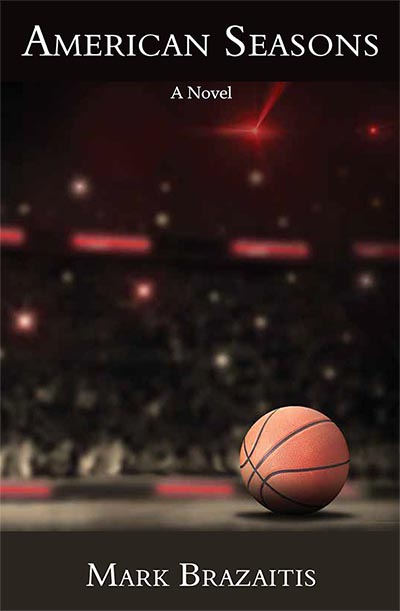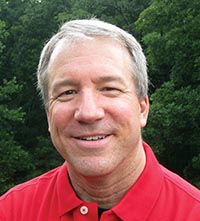American Seasons
a novel by
Mark Brazaitis
ISBN: 978-1-964277-05-9, 228 pages, $18.95 (+ shipping)
Release Date: July 23, 2024
An Advance Sale Discount on this title has expired. The check price is $23/book (which includes shipping & sales tax) and should be sent to: Main Street Rag, 4416 Shea Lane, Charlotte, NC 28227. For wholesale prices, please contact: editormsr@outlook.com
PLEASE NOTE: Ordering in advance of the release date entitles the buyer to a discount. It does not mean the book will ship before the date posted above and the price only applies to copies ordered through the Main Street Rag Online Bookstore.
Synopsis: American Seasons
The early 1960s. A small college. An ambitious basketball coach. His young, idealistic, beautiful wife. Two star-players, one black, one white. The sports editor who hopes to chronicle a championship season. All goes well…until it doesn’t. Past secrets and present tensions threaten to upend the team’s magical season—and explode the lives of everyone connected with it. Are the Songbirds of Sheridan College, like the United States, about to leave Camelot and head into dark and tumultuous times? Or will they overcome grim adversity and triumph?
ONE
I met Walter Anderson, the new coach of the Sheridan College men’s basketball team, in late August of 1961, in his office in what everyone referred to as the Hollow, otherwise known as the Aaron K. Lamb Gymnasium. The Hollow was at the bottom of two large hills, thus its nickname. If Anderson had been coaching today, his office would be on par, in size and accommodations, with the college president’s. But in 1961, basketball coaches had yet to become gods. His office was only a little larger than a janitor’s closet.
His desk was in the center of the room. Behind it were two circular windows, as on a submarine, offering a view of outdoor basketball courts. To my left was a four-foot-tall bookshelf. From my chair in front of his desk, I glanced at the titles. There were sports books: Basketball: Its Origins and Development by James Naismith, the game’s founder, and a couple of Clair Bee’s Chip Hilton novels, Hoop Crazy and Backboard Fever. There were inspirational titles: Norman Vincent Peale’s The Power of Positive Thinking and Bishop Fulton J. Sheen’s Life is Worth Living. But I also discovered novels by Ernest Hemingway, Graham Greene, Ray Bradbury, and—a writer I’d never heard of—James Baldwin. Giovanni’s Room. I made a note to look up the book. I never did.
There was a pair of photographs on his desk, and when Coach Anderson, who’d been headed to the bathroom when I arrived, stepped into the office, I asked him if the woman in them was his daughter. The coach, who was only thirty-eight-years-old (which nevertheless seemed ancient to me; I’d turned twenty-two the previous month), leaned back in his chair and laughed. He exposed his teeth, which were white and exceptionally wide, like prostheses one might buy at Halloween. His hair was strawberry-blond and thinning, exposing the pale heights of his forehead. Although he’d played college ball at Harvard, he was only a couple of inches taller than six feet and was as slim as a ghost.
“She’s my wife,” he said.
I apologized.
He waved it off. “Am I lucky?” he said. “Like a rabbit in a field of four-leaf clovers.” He spoke as if trying to convince me. I didn’t need convincing. The woman in the photographs was stunning, with blonde hair to her shoulders and the kind of lithe body I would later associate with aerobics instructors. She looked like Grace Kelly in the Alfred Hitchcock movies I liked best. Lucky? Yes, I thought Coach Anderson was lucky.
“Aside from the model,” he said, “what do you think of the photographs?”
“Excuse me?”
“I’m the photographer.” From his desk drawer, he removed a camera. It looked like a black box, its lens like a television. “It’s a Hasselblad, the same equipment astronauts use to snap pictures of the stars.” He returned the camera to his desk. “I’m a passionate amateur. I even have a darkroom.”
As the sports editor of The Sentinel, Sheridan College’s newspaper, I was here to interview him. I’d assigned myself the men’s basketball beat. Sheridan College, one of the first Jesuit institutions of higher learning in the country to become co-ed, was known for its small student-to-faculty ratio, its film studies program (the second of its kind in the Midwest), and its debate team, which three years running had finished in the top four in the country. Its athletic teams, however, were abysmal. The men’s basketball team had never finished higher than fifth in the Mid-American Conference. But with a new coach—he’d been an assistant at Harvard and the head man at Guilford College in Greensboro, North Carolina, before he was hired at Sheridan—hopes were high.
I asked him if he thought the Sheridan Songbirds could do any better than they had since the team’s inception in the early 1920s.
He grinned his square-toothed grin. “No,” he said. “I don’t think we can.”
Dutifully, I wrote this down, but when I heard him laugh, I looked up. “Hold the presses,” he said. “I wouldn’t have taken this job if I didn’t think we could win.”
“But the team lost all five starters to graduation,” I reminded him.
“No disrespect to Coach Raymond”—Nick Raymond had retired at the end of the previous season after thirty years of undistinguished basketball—“but he rewarded seniority over talent. There are two players who sat on the bench last season when they should have been starting.”
I asked him who.
“Darrell Williams and Vince Urban,” Coach Anderson said of the team’s co-captains and only seniors. “If we do anything great this season, it will be because of Darrell Williams and Vince Urban.”
In his dorm room, Vince Urban was listening to Buddy Holly, who’d died a year-and-a-half before in a plane crash. If I was handsome—six-feet tall, with thick brown hair touched with red and eyes like a mood ring, sometimes blue, sometimes green, sometimes gray—Vince was (and there is no adjective more accurate) beautiful. He was slim and muscular, with black, wavy hair, dark, soulful eyes, and a Superman square chin. His only imperfection was his nose, which he’d broken playing Little League baseball, but its off-centeredness toughened what otherwise might have been too perfect a face. He was listed in Sheridan College’s press guide as six feet, two-inches tall, but when I shook his hand, we were standing eye-to-eye.
As we sat down on the couch in the common room he shared with his three roommates, I noticed a pack of playing cards on the table in front of us. The backs featured pictures of naked women. Catching my gaze, Vince scooped up the cards and said, “You’ve heard of strip poker. In my version of the game, the cards strip.”
This was a decade before Woodward and Bernstein rewrote the rules about reporters’ relationships to their subjects. I had no intention of offering anything but hosannas to the 1961-1962 Sheridan College men’s basketball team, however pitiful the squad would probably prove, and would be withholding from my readers any mention of Vince’s taste in pornography.
I asked him bland questions about the team. He gave bland answers. My article was shaping up as I thought it would.
In answer to a question about his new coach, he mentioned Walt Anderson’s Harvard pedigree and his success at Guilford. But, as if bored with what he was saying, he broke off. “Have you met his wife?”
“I’ve seen pictures,” I said.
“A girl like her,” he said, “with a Grace Kelly smile and Grace Kelly hair and, hell, a Grace Kelly body…” He rubbed his hands together. “You have a girl?”
“Sure,” I said. “She’s at Notre Dame College, in Cleveland.”
“Catholic girl.”
“Catholic boy.” I tapped my chest, although I hadn’t been a regular at mass since my sophomore year. In conjunction with its recent efforts to attract non-Catholic students, Sheridan College downplayed its religious affiliation. I could be a bad Catholic and still get a diploma.
Vince smiled. “I don’t go to confession because I don’t believe in sin.” He winked.
Vince told me his family history. In 1915, his paternal grandparents had come to Cleveland via Ellis Island, where their last name was changed from Urbanitis to Urban. His mother’s parents arrived on a boat three years later. Vince grew up on East 185th Street and learned to play basketball in driveways on Pawnee and Mohawk and Arrowhead Avenues. I asked him if his father was an athlete. “My father was a drunk,” he said. “He died six years ago coming home from a bar. He was so drunk he fell asleep with his face in a puddle. Drowned.”
“Jesus, I’m sorry.”
“He left me long before he left the planet. I was the man of the house by the time I eight. Sure, he’d come around every so often.” He paused, his expression softening. “He told me jokes sometimes until my stomach hurt from laughing. He could have been a comedian.”
“What was his real job?”
“Bus mechanic. Electrician. Plumber.” He shook his head. “It was an embarrassment how often he was fired. And you didn’t want to be around him or his right fist when he didn’t have work.”
When Vince saw my concern, he waved his hand. “It was nothing I couldn’t handle by the time I learned how to duck.”
I made a sympathetic sound.
“I’m alive and he’s dead,” he said. “Looks like I had the last laugh.”
“Girlfriend?” I asked him.
“Fiancée,” he said. He leaned forward and picked the deck of cards off the table. “Let me find her.” He shuffled the cards and laughed. “Her name’s Morta. A good Lithuanian girl with a strange Lithuanian name. My mother and her mother arranged the whole show when we were ten years old.”
“Morta,” I said.
“Breasts the size of Latvia.” He laughed. “But she’s a good Catholic girl. Slip a hand under her bra, and she thinks you’ve committed grand larceny.”
I spent every other weekend with my girlfriend, Priscilla. We necked in my 1955 Ford Fairlane until our mouths were raw. We’d been high-school sweethearts in Cleveland. I’d attended Benedictine and she’d attended our sister school, Beaumont. Both of our mothers were Lithuanian-Americans who married Irish-Americans. Both of our last names were Kennedy, which, we joked, would simplify the paperwork when we were married. We had no relatives in common.
Did I want to marry Priscilla? I don’t think I could distinguish between wanting to marry her and wanting to make passionate, intoxicating, earthmoving love to her.
“What about your girl?” Vince asked.
“What about her?”
“Is she giving you anything more than headaches and wet dreams?”
If you want to read how this story ends, order now and have it delivered to your door.


 Mark Brazaitis is the author of nine books, including The River of Lost Voices: Stories from Guatemala, winner of the 1998 Iowa Short Fiction Award, and The Incurables: Stories, winner of the 2012 Richard Sullivan Prize and the 2013 Devil’s Kitchen Reading Award in Prose. A former Peace Corps volunteer and technical trainer, he is a professor of English at West Virginia University, where he directs the Creative Writing Program and the West Virginia Writers’ Workshop. He was the sports editor of his college paper.
Mark Brazaitis is the author of nine books, including The River of Lost Voices: Stories from Guatemala, winner of the 1998 Iowa Short Fiction Award, and The Incurables: Stories, winner of the 2012 Richard Sullivan Prize and the 2013 Devil’s Kitchen Reading Award in Prose. A former Peace Corps volunteer and technical trainer, he is a professor of English at West Virginia University, where he directs the Creative Writing Program and the West Virginia Writers’ Workshop. He was the sports editor of his college paper.